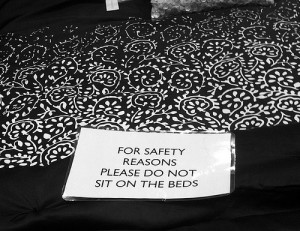Feb 28, 2010
On risk

On Monday 22 February I attended the Post-Bureaucratic Age event. Some very interesting content, and a highly eclectic audience. One detail from one of the presentations has been nagging away at me though.
Professor Mark McGurk of Guy’s & St Thomas’ talked eloquently of a number of ways in which changing practices and technologies affected his business: medicine. Tucked away at the end of his presentation, almost as an afterthought, was a plea about Health and Safety. “Save us from it”, he said (I paraphrase). There wasn’t quite a cheer from the audience, but there was a distinct susurration of approval.
Because we all hate it, don’t we? That nanny state: ripping up those dangerous playgrounds, banning conkers, stopping kids wearing goggles at the swimming pool… A legion of scarebloid articles generated by one ‘excess’ after another. The ‘Elf n Safety culture has gripped us, hasn’t it? It just came from nowhere, and all of a sudden we weren’t allowed to do loads of things that had always been ‘traditional’. Like driving without seatbelts, cycling with headphones, sitting on beds (see picture), caring for a quadriplegic child for the rest of their life with no external support.
Ok, I tucked in a spurious example there which has little to with health or safety, and a lot to do with keeping shop goods clean. But the last one is very interesting. Remember the bouncy castle case a couple of years back? Parents litigating against parents over a tragic accident at a child’s party? Massive damages. Safety experts and insurers bemoaning. A general sense of society losing the plot.
But these were just people, behaving like people. Make the choice yourself: do the noble thing, say it was just an accident – “these things happen” – and prepare for the rest of your life to focus entirely on work, care and worry? Or use a pre-existing set of remedies to share the burden across a very large body of strangers, through their insurance premiums? Perhaps the decision looks a little different?
These remedies were put there for very good reasons: to hold negligent employers and authorities to account. No more would a misaligned machine take off your hand and leave you with nothing but a stump and a change of career. Yes, of course, there are abuses. I remember the (serious) concerns that a wonderful application like FixMyStreet might be misused to find or report potholes which could then be ‘fallen into’, triggering a claim. And ambulance-chasing lawyers are pretty easy to spot.
There’s no easy fix for these (other than vigilance for the most blatant); we sign up for them at the same time as we remove our own personal risk of a lifetime suffering as a result of something which wasn’t our fault. And we wouldn’t want our judgement about the legitimacy of a case to become an ad hominem judgement on the character of a claimant, now would we?
So when Professor McGurk (and all right-thinkers) asks to be left in H&S peace, what precisely is he asking to be removed? Clearly not all the ‘good’ stuff. Just the ‘excesses’, no? And that boundary between good and excessive – care to define it? It gets rather blurry. The swimming goggles ban is particularly interesting. Those advising will have weighed up what they thought were the benefits of wearing goggles (minimal relief from water splash, in some cases medically indicated) and the problems (splintering, constriction, band snapping) and come to a conclusion that the latter outweighed the former. They probably missed out that kids have more fun wearing goggles, can get up to more tricks wearing them, and that everyone finds mild chlorine splashes a little bothersome, just not medically so.
But above all of this, what takes these cases into the realm of the absurd is an utter disconnection with popular perception of risk. Potholes and bacon slicers are risky. Conkers and goggles aren’t. Period. And even more than this, some risks are supposed to be taken. Learning to ride bicycles. Learning basic common sense when sawing a plank of wood.
Net result: it may be possible for rational calculations to look technically correct, but without the addition of broader perspectives, emerge absurd.
As a principle, risk analysis still seems essentially sound. It’s the practice that may be at fault; and in particular this soft set of issues about “what makes something relevant enough to advise on”. A mechanical response to this would be to spend lots of time (and money) publicising dreadful goggle injuries so as to put the dread swimgear firmly in the “you’ll have an eye out” category. A perverse way to deal with it. We don’t seriously want that, do we?
So when the good professor calls for the removal of a health and safety culture, I hope he’s just suggesting it’s done properly.
I’m often troubled about the apparent disconnection between personal responsibility and societal effect. And how readily an audience can nod along to broad statements which neglect the real complexities in this area, with seemingly little pause for thought.










Your post reminds me of a conversation I had a few years ago about playground risk: http://www.gallomanor.com/2007/01/make_playground.html
Whilst we removed all that danger we perhaps forgot the other damage we could be causing – hampering learning significantly. H&S also reduces people ability to assess the risks themselves.
Perhaps what your professor meant was that we should avoid the mis-use of H&S regulations (and Data Protection) that prevent people from doing their jobs and/or enjoying their lives. By mis-use I mean quoting H&S because it is easier than working out the best answer.
And taking your goggles issue further…
Surely the answer isn’t to ban googles but to warn kids to look for problems with their goggles?
Interesting. I worry that it’s the insurance risk – “we won’t cover you if/unless…” that rules more than H&S per se…